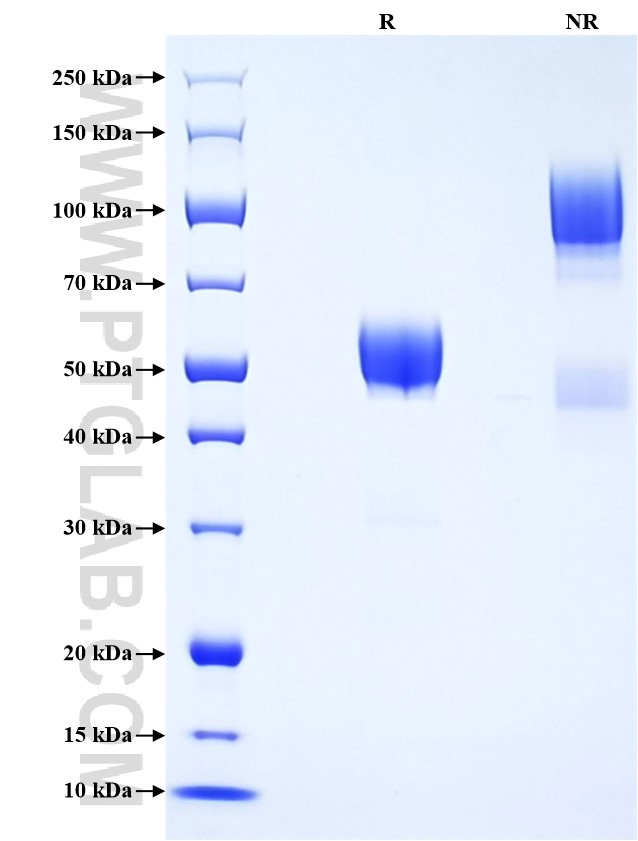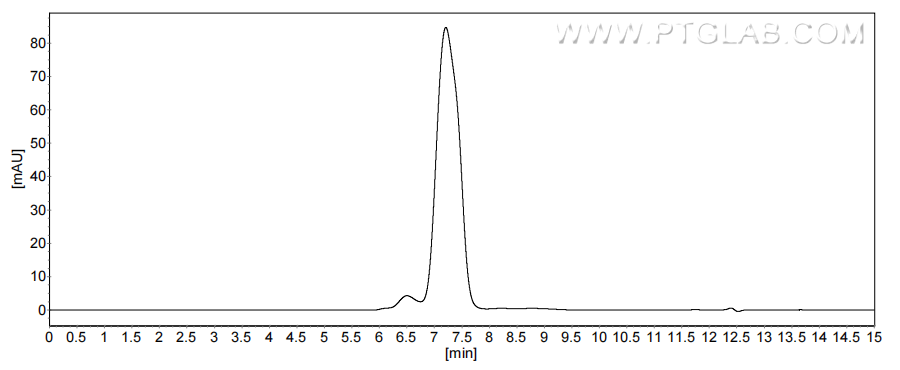Recombinant Human CD7 protein (rFc Tag)(HPLC verified)
种属
Human
纯度
>90 %, SDS-PAGE
>90 %, SEC-HPLC
标签
rFc Tag
生物活性
未测试
验证数据展示
产品信息
| 纯度 | >90 %, SDS-PAGE >90 %, SEC-HPLC |
| 内毒素 | <0.1 EU/μg protein, LAL method |
| 生物活性 |
Not tested |
| 来源 | HEK293-derived Human CD7 protein Ala26-Pro180 (Accession# P09564) with a rabbit IgG Fc tag at the C-terminus. |
| 基因ID | 924 |
| 蛋白编号 | P09564 |
| 预测分子量 | 42.5 kDa |
| SDS-PAGE | 47-60 kDa, reducing (R) condition |
| 组分 | Lyophilized from 0.22 μm filtered solution in PBS, pH 7.4. Normally 5% trehalose and 5% mannitol are added as protectants before lyophilization. |
| 复溶 | Briefly centrifuge the tube before opening. Reconstitute at 0.1-0.5 mg/mL in sterile water. |
| 储存条件 |
It is recommended that the protein be aliquoted for optimal storage. Avoid repeated freeze-thaw cycles.
|
| 运输条件 | The product is shipped at ambient temperature. Upon receipt, store it immediately at the recommended temperature. |
背景信息
CD7, or T-cell antigen 7 or GP40, is a transmembrane glycoprotein and a member of the immunoglobulin supergene family. CD7 is predominantly expressed on thymocytes and mature T cells, as well as natural killer (NK) cells, and it is one of the earliest antigens to appear on cells of the T-lymphocyte lineage. CD7 plays a significant role in T-cell and T-cell/B-cell interactions during early lymphoid development. It is involved in the regulation of cell signaling and biology, including T-cell activation, proliferation, and the expression of interleukin-2 receptor alpha (IL-2Rα). CD7 is not only a marker for T-cells but also has functional implications in immune cell interactions and adhesion. It can provide co-stimulatory signals and is associated with CD3 and CD45, participating in T-cell activation.
参考文献:
1. G D Sempowski. et al. (1999). Crit Rev Immunol. 19(4):331-348. 2. StillwellR. et al.(2001). Immunol Res. 24(1): 31-52. 3. WeiSD. et al. (2005). Cell Death Dis. 9(3): 293.

